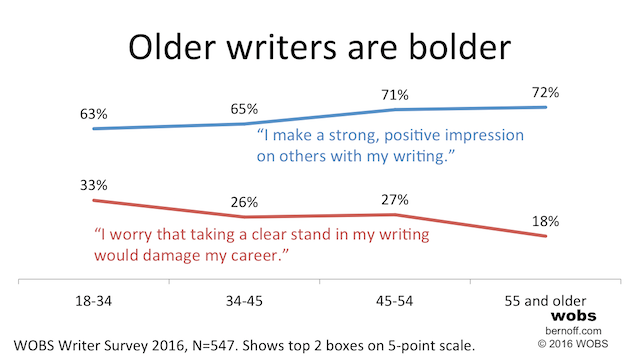Bold writing helps, not threatens, your career (Survey Data)
Does clear writing make you vulnerable, or boost your career? According the business writers I asked, it’s more likely to help than hurt you. And the older you get, the bolder you get.
When I surveyed 547 business writers early this year, I asked whether they agreed with the following two statements:
I make a strong, positive impression on others with my writing.
I worry that taking a clear stand in my writing would damage my career.
The subtitle of my book is “Boost Your Career by Saying What You Mean” — so I wanted to see if business writers in the real world agreed.
Most agree that bolder is better
Of those I surveyed, 67% agreed that they make a positive impression, and 25% worried that taking a clear stand would hurt them. The people willing to take my survey have a bias — they tend to either love clear writing or aspire to it — but it’s clear that most of them feel it’s more likely to help their careers than hurt them.
There’s a moderate age effect here: Older writers are less worried and more confident about the impressions they make.

Among writers, men are more confident and women more worried, although the effect is not that pronounced.
| Men | Women | |
| I make a strong, positive impression on others with my writing. | 72% | 64% |
| I worry that taking a clear stand in my writing would damage my career. | 23% | 26% |
Those who worry think their writing is not as good
Why do people worry that taking a clear stand will hurt them? I looked at those who agreed or strongly disagreed with that statement (138 out of the 547 people I surveyed) and compare them with those who disagreed or strong disagreed 333 people). Those who worried about the effect of taking a stand:
- Think their writing is less effective (6.2 on a 10-point scale, compared to 7.2 for those who don’t worry about taking a stand).
- See more problems with their writing. They’re more likely to say it is too long, not direct enough, not precise enough, or uses too much passive voice, compared to those who don’t worry.
- Think they’re less effective. Among those in my sample who did a two-week writing project, only 58% of the worriers agreed that people took action based on what they wrote, compared to 79% of the non-worriers.
- Need more feedback. Only 40% of the worriers said they go the editing feedback they needed to make their writing better, compared to 53% of the non-worriers.
I believe there is a clear message here. If you worried that clear writing is dangerous for you, you may be right. It is a skill you must develop. Learn to write more boldly and powerfully — and get a good editor — and you will gain the confidence to write in a way that helps your career.
Survey methodology here.